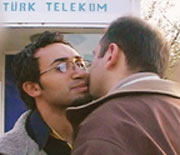 Parvez Sharma, an Indian-American documentary filmmaker, is gay and Muslim. Sharma’s feature length documentary, “A Jihad for Love,” which opened in New York last month, is a brave and a powerful film exploring how some Muslim gay men and lesbian women around the world reconcile their sexuality and faith despite threats of persecution. It is playing in limited release at various U.S. cities. Sharma spoke to Idol Chatter about his own commitment to Islam and how he resolves his faith with his sexuality
Parvez Sharma, an Indian-American documentary filmmaker, is gay and Muslim. Sharma’s feature length documentary, “A Jihad for Love,” which opened in New York last month, is a brave and a powerful film exploring how some Muslim gay men and lesbian women around the world reconcile their sexuality and faith despite threats of persecution. It is playing in limited release at various U.S. cities. Sharma spoke to Idol Chatter about his own commitment to Islam and how he resolves his faith with his sexuality
How is your film a response to the post-9/11 world?
[9/11] was a huge calamity for all brown people, regardless of religion. But I realized that we were not going to allow Al Qaeda to control the discussion about Islam in this country. I had to come out as a Muslim. At the same time I felt that I had to start a dialogue about my being gay and a Muslim.
Your father is Hindu and your mother was Muslim. How did you convert to Islam?
I converted to Islam after my mother passed away. I felt I owed it to her. I wish she was around to have some of these conversations, because a lot of the guilt I had in the last days of her life, when I was also coming out as a gay man, was around Islam. My father took pride in my formally becoming a Muslim. But he didn’t take the same pride in my coming out. It still remains an issue.
Mazen, the Egyptian protagonist in your film was persecuted for his sexuality, and yet he is not angry. How is it that he and the other still love Islam?
I think Mazen is really the heart of the film. I have never encountered a gay person who has been through so much as Mazen, but his story is full of hope.
Following 9/11, I could have made an angry film. But it didn’t turn out that way. After I met Mazen and Muhsin Hendricks (a gay Muslim cleric from South Africa), I realized that you cannot change anything in the world with anger, especially when you are dealing with a religion and hundreds of years of orthodox thinking. If you approach religion with anger, you will get an angry response back. But if you take the human approach, then that barrier from theology has to face a human front.
That is one of the reasons I do not have a fatwa on my head today. If I had made an angry film, I think I would have been targeted by now.
In your film families are a focal point. Why was this important to you?
I did it very deliberately, because I don’t think you can look at Islam as a religion in isolation. It is practiced in the community, and it’s our culture, the way we eat and celebrate our festivals. It’s very hard for people to say ‘I am not going to be Muslim. I am not going to be religious anymore.’ If you do that, you are leaving your sense of belonging.
–Aseem Chhabra


